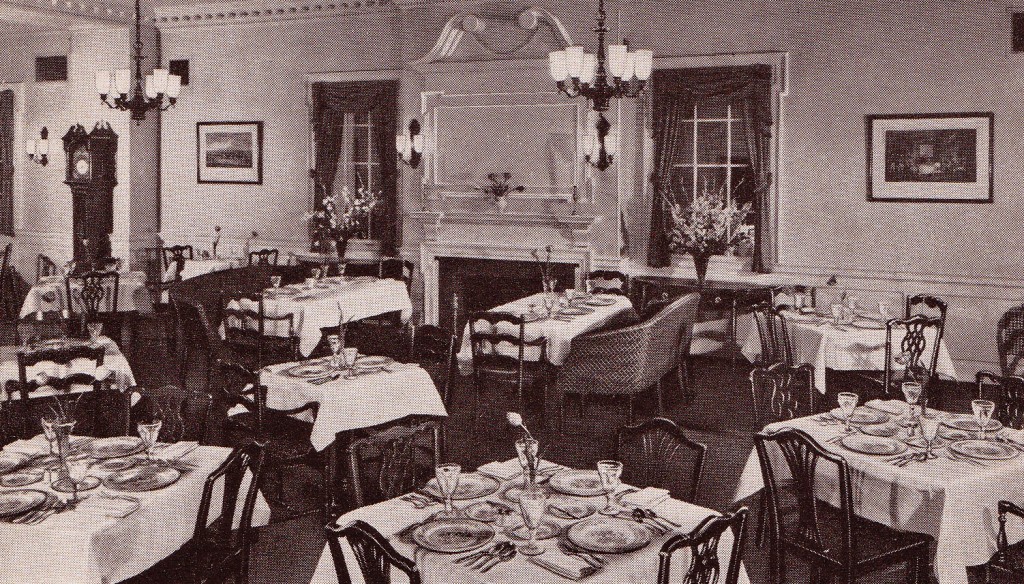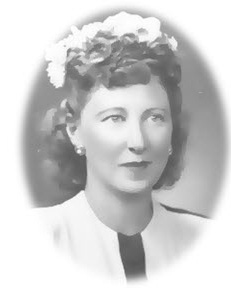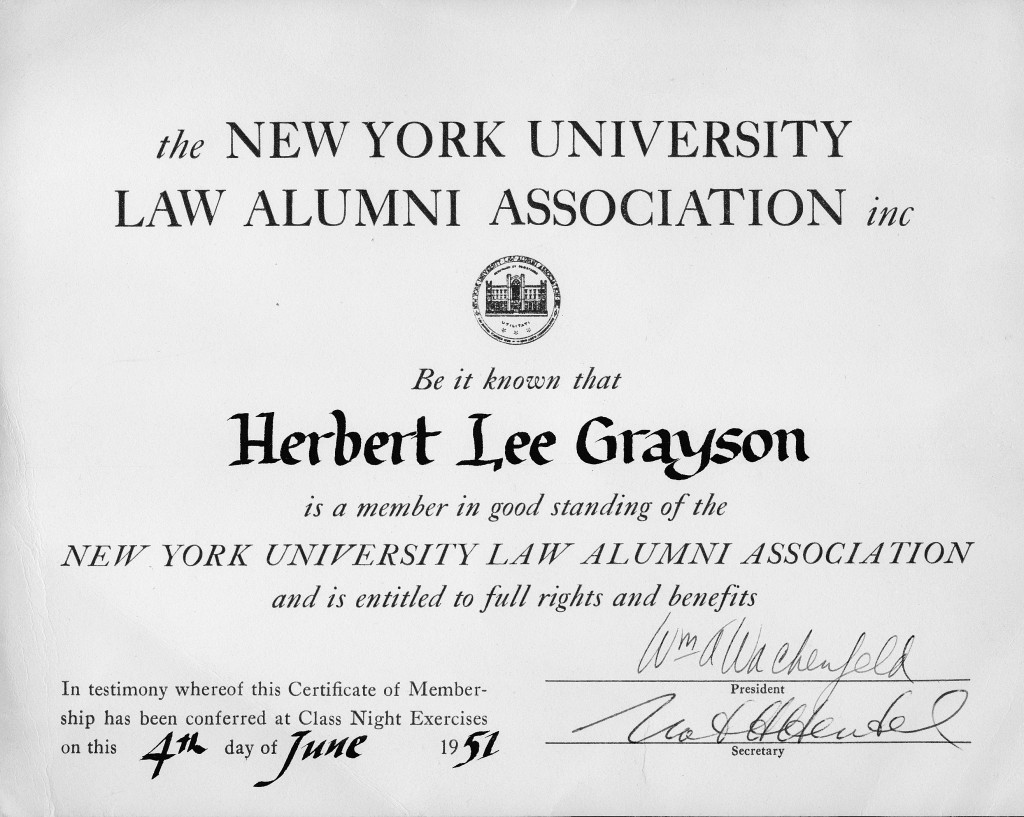From the switchboard I move to filing, and then to the secretarial pool which brings me to the sales department. I take evening courses in touch-typing, speed-writing and transcribing from a dicta-phone.
When I move to the accounting department the company sends me to a course on the workings of a new accounting machine.
There is a small group of people taking this course. The instructor guides us slowly and carefully through a manual. This course is going to last a whole week.
On the second day my boss in accounting tells me that the business machines people say that there is no need for me to go back because I have learned all that I need to know. Truth is, it was all in the manual anyway, and I read it while standing around waiting for everyone to take turns getting to the next step.
I am feeling pretty confident.
I get my come-uppance when I get to post numbers on that machine all day long.
What is it with me and posting numbers that I am thinking if there is a place in Dante’s purgatory for me it would be a little corner where I must post numbers on an infernal machine until day 00.00
The only relief from this stultifying boredom is at the end of the fiscal period when we discover a small discrepancy in the accounts. Then we egg hunt through the numbers till we find the last penny and balance the books.
Mercifully, I get moved again.
Mr. G. is notorious for being difficult to work for and for firing his executive secretaries. My boss in accounting tells me that I am being moved to the inner sanctum to replace the secretary Mr. G. just fired.
I get a small office adjoining Mr. G.’s at the end of the hall, but my desk is in the hallway directly outside the door of his office. My office holds Mr. G.’s personal files.
The office next to Mr. G.’s belongs to a Vice President who is also a director. He owns a large block of stock in the company.
He is a jovial, pleasant man who spends relatively little time in his office. He goes out for long business lunches and golf dates where he schmoozes with important people.
The office next to the Board Room belongs to a young man. Mr. G. introduces him as his son, but they have different names. I don’t ask why. Mr. Grayson is the Secretary of the Corporation.
There are connecting doors between all these offices so that you can go from one to another without stepping out into the hallway.
One day Mr. Morgan the consultant shows up.
Mr. G. calls me into his office. By this time, I don’t bring in my notepad for dictation unless he says that it is a legal document.
I come in and am still walking near the door when Mr. G. starts dictating. Miss Cotton, please write a letter to so and so and tell him this, and this and this and so on. After he finishes, he says will you please repeat what I said.
So I do.
Then he turns to Mr. Morgan, see? What did I tell you?
Mr. G. is fond of making his point with a little drama, as though he were presenting evidence. He hasn’t forgotten that Mr. Morgan had said that I should take the job at AT&T.
I’ve noticed that this kind of one-upmanship bantering goes on all the time with these guys, much of which is just fun and games.
Mr. G. hands me a company check he has signed and says take this to the mayor’s office. It is a donation to some kind of scholarship fund and the mayor is having a reception for the donors.
The V. P. says why does she have to schlepp? Give it to Al. Al is the man in the mailroom who is also our hand delivery messenger.
Mr. G. says I want her to meet people and know what is going on.
Besides, she lends us class.
Mr. Grayson quips it’s that British accent because she speaks the King’s English.
That’s his kind of wit and also his way of cutting through the uh hyperbole.
I like him, but he is a bit of an enigma.
He is only the Secretary of the Corporation, but when the lawyers come by for a conference in an important case he is always included. Not only that, but Mr. G. sounds him out before every meeting.
More than once Mr. Grayson zeros in on the weakest link in the case they are building.
I am surprised when Mr. G. makes the same observation at the meeting as though it were his own insight. Mr. Grayson does not mind.
After a while, I realize that everybody knows who the sharp legal brain is anyway.
This puzzles me. Why isn’t Mr. Grayson practicing law on his own? This is a manufacturing company and there are relatively few lawsuits all of which are handled by the law firm Royall, Koegel & Rogers, our general counsel.
Mr. G. does not practice law anymore. He just likes to keep tabs on everything that is going on.
He gives every company truck driver his private office number as well as his home number. He tells them if you have an accident, whether it’s your fault or not, immediately call me collect, day or night. Don’t speak to anyone before you call me. They know he means it and they always call him first.
I get calls from Mrs. G. almost daily from their home on Long Island. She has trouble keeping staff. Mrs. G. seems to need help with so many routine things that go with running a household that sometimes I think she just wants to talk to someone besides the maids.
Mrs. G. asks me to meet her for lunch. However, she wants to keep our meeting secret from her husband and her son, Mr. Grayson. I agree to set a date, but of course I ask the boss first. He says go and we will say nothing more about it.
We meet at Schrafft’s Restaurant, a favorite with shoppers. Mrs. G. has come into town to do some shopping with her sister but I see her walking away with her shopping bags.

Schrafft’s, New York City
After the pleasantries, very quickly I see that Mrs. G. is asking me to be a kind of benevolent spy. She wants to know what is happening between her son and her husband. She wants reports on any conflicts between them, but actually I think that she really wants to know about her son.
I assure her that everything is fine between them as far as I can tell.
She says no, you don’t understand.
She says Mr. G. was always all about work. Right after they were married he started his law practice with another lawyer. The first month, his friend had a few clients who paid him while Mr. G. had nothing.
Well, the second month at the office was no better. His friend started to worry.
Her parents had given them a house as a wedding present, all furnished since her father owned a fine furniture store. Mr. G. had some money saved up which carried them.
After a while, Mr. G., who was a negligence lawyer, settled his first case for enough money to pay his share of the office expenses for the rest of the year. Then he got another case, and another.
I am the one, she says, who urged him to go out on his own since he made so much more money than his friend. He also worked harder than anyone I knew. You should have seen his office. He had a big chart on the wall showing every bone in the body. He had so many medical books you would think he was a doctor. You know how he is.
I sure do.
Can’t be easy working for him but I hear that you are very competent and smart and the proof is you’re still there!
She is attractive when she laughs. I can see that once she was a beauty as everyone said.

Rae
I say I like my job. It’s never boring. There’s always something new to learn.
My husband became the most sought after negligence lawyer in New York. Then they came after him. They said he was “ambulance chasing.” Have you ever heard of such a thing?
I shook my head no. It actually sounds comical.

Ambulance Chaser image at ocweekly.com
I had to ask my brother Al. He explained to me that my husband was raking in money from too many big cases and leaving little for anyone else. So they ganged up on him. Insurance companies, lawyers, politicians, they dug up a rule to nail him – lawyers are not supposed to pay anyone to send accident victims to them. But many lawyers were doing just that.
They started with a newspaper article reporting corruption and demanding an investigation. Then they accused about a dozen lawyers, including my husband. They suspended their licenses for periods of time.
But my brother said people wanted my husband to handle their cases because he got the largest settlements. Everybody knew it. They were beating down his door. He didn’t have to pay anyone to get clients.
Just the same, they got him disbarred.
He fought back. Three years later after getting more than a thousand recommendations from lawyers, highly respected doctors, rabbis and other prominent people, he appealed.
More than a thousand recommendations?
You know him. If one is good a thousand is better.
He swamped them!
We both laugh.
After that they said that he had been punished enough and they gave him back his license. I told him, be careful. Don’t take so many cases.
But he knows only one way of doing things and that is all out. He can’t help himself. He became even more successful.
They set him up again and this time it was personal. He had just won a large settlement for the widow of a baker who was riding on a bakery truck and was killed by a trolley.
The transit company used the D.A.’s racketeering division to sweat and browbeat his chief witness, a timid young man. They even got hold of this man’s mother, poor woman, and finally they got him to recant on his testimony.
Then they charged my husband with suborning perjury. Again they disbarred him. Again he vowed to fight back. But it was more serious this time, and he knew it would be a much longer and harder fight to clear his name. In the meantime he closed his law office and found something else to do.
Herbert took it hardest. You wouldn’t know it now, but he has the same energy and drive as his father only not so rough. He grew up different. His father always wanted to give him the advantages he never had.
When Herbert was at Wharton, we went to visit. He lived in a fraternity house. He was in there with a lot of boys who came from money. His roommate Freddie’s mother was one of the Fox sisters- you know the department store people?
Yes. I know who they are.
That fraternity house was a mansion. I never expected anything like that.

Zeta Beta Tau Fraternity House at University of Pennsylvania
These were just boys, but they had a butler and their own chefs and waiters who wore white gloves.
You see, after the terrible things people suffered in the war over there in Europe, where they lost everything, they used to say that living well is the best revenge. But making and having tons of money doesn’t mean that you will live well.
We saw too many young men with money to burn ruin themselves with boozing and whoring.
The fraternity had rules for how they should behave as gentlemen. Of course if a boy did really bad things socially they kicked him out even before the university did.
Sometimes they kept one another in line. Herbert told us how if anyone showed crude table manners the others would just pick up and move to another table.
Herbert doesn’t have the thick skin his father got scrounging his way up from the bottom.
He had a successful father who was recognized as one of the best in his profession, someone to be proud of when he was growing up. But after the second time his father got disbarred, things changed.
Herbert still wanted to be a lawyer. When he got his law degree, graduating at the top of his class, his father was so proud.
But then he said Herbert must protect himself and change his name legally.
Herbert said absolutely not. It went against his grain. He didn’t want to do it. Oh how they fought. In the end Herbert gave in.
It didn’t help. People remember that my husband got disbarred twice but they don’t care that both times he was exonerated.


Legally changed name
When my husband and his friends were taking over Central Foundry Herbert was in the middle of it, helping his father.
At that time like other young men Herbert and his brother went out with lots of girls. We didn’t pay much attention until he brought someone home. She was a lovely girl from a family like ours. Her parents were very keen on their daughter’s marrying Herbert.
Even though the public company they took over was on the brink of going out of business, the old management fought to stay in control.
They brought a lawsuit. They dug up the old business of the disbarments. The court battles were in Alabama, but the Brooklyn newspaper which had started that first investigation published the accusations most people had forgotten.
Then Herbert’s girlfriend broke off with him just like that.
Oh, never ever tell Herbert that I told you about that! Promise me.
I promise, of course.
She says I worry about Herbert. I want you to tell me how he and his father are getting along. They always say there’s nothing to tell you it’s only business you’re not interested in that. That’s true. When they talk business at the dinner table I always say don’t talk business.
You can tell me anything, I won’t say it’s you. We women have to stick together!
I feel like a double agent but I’m never going to be a good spy. I know investigators and spies are secret movers in the real world but something about it turns me off. From me Mrs. G. will hear only assurances that all is business as usual at the office.
Mr. G. kept his word and never asked me about my meeting with his wife.
Before my lunch with Mrs. G., I already sensed that all was not well in this family.
I come in to work one morning and they tell me that Mr. G. has become ill while at a business dinner in town and was taken to the hospital. They are keeping him there for a few days.
Before lunchtime he is on the phone.
Miss Cotton, do I have any messages? I say nothing that can’t wait and then I ask him how he is doing.
They are doing tests he says in a weak voice that does not sound like him.
Miss Cotton, he says again in that weak voice, please go to the florist and pick out a large arrangement of flowers. Send it to me here right away with a get well card. Sign it from a friend and charge it to my account.
I decide to bring some mail and go there at visiting hour.
I am the only visitor. There is only one (lavish) floral arrangement from “a friend”. Where is his family?
The next day, he is back in the office in full voice. I don’t think they did all the tests they wanted, more than likely he prevailed over his doctors and cut short his stay.
Mr. G. loves to tell stories about how far a dollar would go in the good old days of his youth. On the lower East Side he says for twenty-five cents you could buy a hotdog with a serving of sauerkraut and a beer. I heard that one more than a few times.
He is proud of being frugal. Not frugal as in skinflint but frugal as in smart. As a default position in running a business in the no frills plumbing industry being frugal is a necessary virtue.
Mr. G. likes to boast I took a dying company and brought it back to life! Saving money for the stockholders is an obsession.
He and his group succeeded in a hostile takeover of this company when it was on the brink. They did not fire any workers but replaced most of the management at the top.
Then Mr. G. cut the frills. Instead of expensive offices in a prestigious building he installs the company’s headquarters in this building which he owns, at a reasonable rent. He takes a low salary and keeps an eagle eye on all expense accounts, including his own.
After that dinner I served Mr. G. and his friend at the Top of the Sixes, our P.R. guy asked me what tip he gave me. I told him. He says cheapskate! Actually, it was an appropriate tip.
Never mind that Mr. G. gives sufficient amounts of money to charity to be described as a philanthropist, he would still want you to know that he is smart about cutting costs and saving money.
But sometimes you see that it’s an old habit to a fault and not always smart.
The company’s Directors are seated at the conference table. Mr. G. comes in and greets them. As he goes around to his seat he looks out the back window. Suddenly, he turns to the men.
Excuse me, gentlemen, he says, I’ll be right back.
And he bolts from the room.
I look out the back window and see two workmen securing a load of old boards and other trash on a pickup truck. Mr. G. runs out from the building and shouts at them.
They help him up the back of the truck. He jumps on the boards, compressing the load by a third. He gets down off the truck and the workmen go for more trash to fill the truck.
I can’t believe my eyes. I am relieved that none of the directors got up to join me at the window.
Minutes later, Mr. G. calmly walks into the room without comment and takes up the meeting’s agenda.
We have a WATS (Wide Area Telephone Service) line at the switchboard. This is a long distance line that the company pays for at a fixed rate and which the operators connect to users all day long, mostly in the sales department.
The official closing time is five o’clock and the whole office clears out, including the switchboard operators.
But then, there is that WATS line not to be wasted, and I know how to connect it. Mr. Grayson found out how to connect it also, in case I am not there.
But there is another good reason to hang around the office for an extra hour or so – avoiding rush hour.
The word gets out that there are always a few of us here. And so people call up, come by with prospects and new ventures, conversations are less guarded, and the receptionist is not there to interrupt anyone.
The only other person in the building is Mr. Kronen, a grey-haired gentleman who keeps on working past five o’clock in the accounting department in the back. He never leaves before us.
I see Mr. Kronen hurrying towards us down the hall. He says in a hushed voice there are sounds back there near the freight elevator. He’s afraid we have a prowler.
Mr. G. is in his office with Mr. Hanwell, our Treasurer, using the WATS line. I wonder if I should knock.
Without a word Mr. Grayson heads towards the back. I follow him but he turns and gestures to stay a few steps behind him.
He comes to the closed door of a storeroom on the other side of which is the back stairs.
He opens the door and immediately switches on the light.
There is a man standing across the room holding a knife pointed at him. The man has the look of a trapped animal.
Mr. Grayson says are you looking for a job?
Uh yeah, a job, the man stammers. He is still holding the knife.
Look, our office is closed now but if you come back in the morning we’ll give you a job.
Yeah. Sure.
Be here about ten o’clock.
The man nods. He has lowered the knife.
Then he sprints towards the stairs and he’s gone.
Before I can say anything, Mr. G. and Mr. Hanwell, and Mr. Kronen behind them, all come running.
What happened? What happened?
Later I remark to Mr. G. how Mr. Grayson showed no fear.
Why should he be afraid, he says, he knows he can take the knife away from that bum.
The V.P. is out for a long lunch, which is expected. From the hallway I see Mr. G. walking through two connecting doors into Mr. Grayson’s office. Mr. Grayson is still out for lunch.
Where is he? Mr. G. barks.
I think I saw him back there.
I’ve been telling little white lies since Mrs. G. put me into the middle of their family saga.
Look at that, Mr. G. fumes. He doesn’t even bother to open his mail. He’s more interested in that bimbo Marie who’s such a drunk he can’t even take her to a nice dinner party.
I say he goes out with other women too. There’s Carol. Mrs. G. knows Carol and she even met her mother. She likes them.
What does my wife know about such things!
I am surprised that Mr. G. mentioned the dinner party. It was a sit-down semiformal dinner given by the V. P.’s son and daughter-in-law. No doubt someone has told Mr. G. that at the last minute I filled in for Marie but he doesn’t say it.
Mr. Grayson said that Marie, a sometime model, has been hounding him with her usual complaints. It always comes down to her badgering him to marry her and his not wanting to get married.
Theirs is an on and off relationship. She accuses him of never taking her to meet his uppity friends or his family and then the quarrel always circles back to her drinking and doing outrageous things which she then says is his fault because he drives her to drink and if she is good enough to keep she’s good enough to marry.
Marie promises she will stay sober if he gives her a chance and in a mad moment he agrees to take her to Richard’s dinner party. By late afternoon she is soused. Would I go with him?
There is some kind of unwritten rule that you don’t date people working in the same office. Something based on common sense that if you date and you break up then someone has to change jobs.
But this is not a date, he insists, it is a rescue. And it is just this one time. So I put on my chicest little black dinner dress and go with him.
Everyone in the office still calls me Miss Cotton, but after that dinner Herb and I are more comfortable with our first names.
Mr. G. comes down the hallway followed by a man with his whole head covered with bandages, some of them slightly bloodstained. Why isn’t this guy in the hospital? What happened?
It’s Herb!
You should be in bed, a hospital bed.
I’m okay, he says.
Last night Marie was in a drunken rage and split his skull open with an ashtray.
Sixteen stitches.
He refused to stay in the hospital and drove himself home to Long Island.
He came into the office to escape his mother’s fussing over him and most of all to stop her probing questions.
His father made me order in lunch for him.
When I tell this story to Liam he says what Herb did was crazy he could have passed out and died and from then on he referred to him as “the crazy one.”
Herb healed fine and you couldn’t tell if there was a scar under his hair.
We are almost ready to leave the office. I am gathering up some papers on Mr. G.’s desk.
Look, he says, don’t you think I want to promote Herbert? He is my son.
Did Mrs. G. bring this up again?
But I can’t do it he goes on. This is a public company. With his attitude, if I promote him everybody would say that it is nepotism. I can’t do it.
This is interesting. I put down the papers and sit on a side chair.
I say he is certainly qualified. Maybe he needs a more demanding position to stay interested.
That’s not it. He just doesn’t care. Look at him. Look at the way he dresses. He hasn’t bought a new suit in years. He should give his overcoat to the Salvation Army if he can get them to take it.
You don’t pay him enough to buy clothes like yours.
No, that’s not it. He has plenty of money to keep an apartment for that bimbo even though he lives at home where he has no expenses whatsoever. Besides, he knows how to make money. What do you think they teach them at Wharton?
Sure, I say. But I bet he doesn’t even think of his clothes or of making an impression.
Well, he should.
He’s learned to be frugal.
I let that sink in a bit.
Look, what if you offered to pay for some new clothes for him. That would show him something. Would you do it?
Sure I will!
Good.
I slip out of there and close the door behind me. I grab my phone.
The manager at Kolmer Marcus says they are just closing the store but he will be happy to keep a salesman and a fitter for Mr. G.’s son.
I tell Herb.
This I got to see, he says.
His car is parked right outside. We speed to Kolmer Marcus where they welcome us with open arms.
I am a decisive shopper. This one, I tell the salesman. He takes the suit to Herb and the fitter takes over.
This one also. The salesman likes my taste.
The manager is quick. He guides me to evening wear. I pick out a tuxedo and the trimmings.
Then I pick out sports jackets each with two pairs of trousers.
By the time Mr. G. comes knocking on the door they have fitted Herb with a whole wardrobe and I am deciding between vicuna overcoats.
Mr. G. must realize that I have put one over on him. Why is he smiling?
The manager says Mr. G. your son looks like a movie star.
Everyone is smiling.
As we leave the store I hear the manager say to Herb behind me come back soon and bring Miss Cotton.
Does style reflect the man? I don’t know, but something changed.

Herb
Herb is promoted to Executive Vice President and he gets much busier.
One of his new tasks is to show me how to put together the company’s Annual Report. As we are writing the President’s Letter, we get into a discussion about the gerundive, which he brings up.
I think (fondly) of my liberal arts friends who thought we were culturally superior to the greedy guys in business school. Hey, here’s a guy who went to business school and discusses the use of the gerundive. How do you like them there apples?
When General van Fleet said I should go for the exotic girl’s part in Sand Pebbles, I gave him a photo to submit, but I think I should take another photo, one in which I try to look more Oriental for that part.
Herb takes me to a professional make-up artist who does a pretty good job of changing my look. He then takes me for a sitting with a friend who takes still photos for the movies.
No one will take money from me for their services because they are doing it for Herb.
Mr. G. gives a job to an old gentleman whom he introduces as his long-time friend. Judge Schlegel will use the desk in my office.
I have finished overhauling the filing system in there, which had been a huge jumble of files mixing together the business of this company with Mr. G.’s other businesses. Took a while but I sorted it all out.
Now I only have to go in for files but I don’t spend much time in there.
Judge Schlegel sits at the desk in my office and mainly reads whatever Mr. G. sets before him. Sometimes he writes down his opinions, but most of the time he waits till Mr. G. calls him into his office.
When I address him as Judge Schlegel he says no, I’m retired. Just call me Mr. Schlegel. I find that a little odd. I know retired judges who still like to be called Judge.
So I ask Herb.
He says Saul Schlegel is the lawyer who started out with his father.
They are so different, how did they ever get together?
They were friends. Schlegel went to college and then graduated from law school summa cum laude.
Herb’s father didn’t even go to college. He didn’t need to. Back then to become a lawyer you could just study law and if you pass the bar you put up a shingle and you’re in business.
His father and Schlegel didn’t form what you would think of as a law firm today. They were just sharing an office and expenses.
How did your father get so successful?
Street smarts. He was obsessive about digging up evidence. He had a nose for sniffing out weakness on the other side. He was relentless. He loved to build suspense and spring surprises.
But he was a trial lawyer, I say, didn’t he have to argue cases? Did Schlegel do that part?
No. Schlegel was not a negligence lawyer.
His father settled almost all of his cases. The couple of times that they went to trial he hired the best lawyers to argue the case in court. He knew who they were.
Schlegel was a scholar. Later he got into politics and ran for congress but he lost. Eventually he became a highly respected Judge in the State Supreme Court.
Recently he had some serious setbacks in his personal life and he took a shortcut he shouldn’t have. This happens more often than you think. Normally, no one would have gone after him and in time he would have redeemed himself. But judges make enemies and he had some grudge enemies who pounced.
Except for his visits with Mr. G. Mr. Schlegel keeps to himself. He always comes in on time and leaves at five o’clock. Actually, he doesn’t have enough to do but stays occupied, mostly reading at his desk.
Soon we get to talking. In spite of his troubles he is witty and fun and loves to tell stories especially about justice and what he calls the vagaries of the law.
He tells the story of a man whose wife sued him for divorce because of his impotence. At the same time, his mistress brought a paternity suit against him.
They both won!
Mr. Schlegel laughs. There you have the vagaries of the law.
Before long I look forward to our conversations. Sometimes Mr. Schlegel takes me back to his good old days and his friendship with Mr. G.
I ask him why he thought Mr G. was so successful as a negligence lawyer.
It was many things. First of all, he had a natural talent bordering on genius. But there was something else. I would say it was his passionate loyalty.
Loyalty? To whom?
Mr. G. came from indigent immigrants, people who had left all their property behind when they fled from the pogroms in Russia. Everyone he knew struggled. He was the youngest of seven children. His mother was so overworked that she let his older brother feed him and take care of him.
Yes, his brother Isidore. I know about Isidore. Mr. G. sends him a monthly check for everything he needs.
Mr. Schlegel says Mr. G. never forgot his roots. He was fiercely loyal to his own struggling family and neighbors and he extended that loyalty to others like them. Most of his clients were poor working people. Getting compensation for them was his passion. That’s what drove him.
Sure, he likes the money. It gives him power and influence. But you must have noticed that he doesn’t know how to enjoy being a wealthy person. It’s the work he truly enjoys. Not many of those left.
I know what Schlegel means. It’s true. Even though Mr. G. doesn’t practice law anymore he can’t resist being an advocate for the injured.
Mr. Manice our personnel manager comes to see Mr. G. Sam, one of our supers is in trouble again. Manice just received a letter. Some local furniture store is garnishing Sam’s wages.
Mr. G. takes the letter from Manice. Leave it to me, he says.
We are going over today’s mail but he drops everything and calls the furniture store on his private line.
I hear him ask to speak to the owner. First Mr. G. identifies himself. This is just between the two of us business owners he says but the unspoken fact is that they are not equals.
Mr. G. complains that the furniture is overpriced and it is so poorly made that it has fallen apart before our employee has even finished paying for it.
Now you threaten to garnish his wages! The poor man will have hardly enough money to feed his family and certainly no money to buy new furniture. He has diabetes and gout. He can’t work any more hours. What is he supposed to do?
By the end of the conversation the furniture store owner has agreed to withdraw the garnishment order and to send Sam a new set of furniture, just to get Mr. G. off the phone.
When I tell Mr. Manice he is relieved but not surprised. Shaking his head he says I don’t know how he does it.
I am beginning to see why they formed a consortium to get rid of Mr. G.

Recent Comments